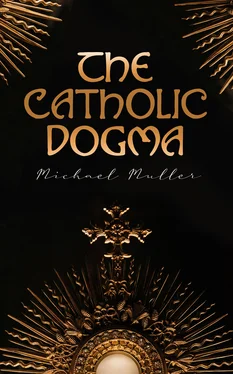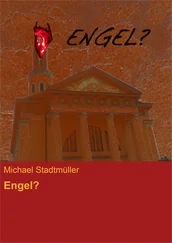But what is more apparent and better known than the spirit of covetousness of Protestantism? Wherever Protestantism secured a footing, it pillaged churches, seized Church property, destroyed monasteries, and appropriated to itself their revenues.
In France, the Calvinists destroyed twenty thousand Catholic churches; they murdered in Dauphine alone two hundred and twenty-five priests, one hundred and twelve monks, and burned nine hundred towns and villages. In England, Henry VIII. confiscated to the crown, or distributed among his favorites, the property of six hundred and forty-five monasteries and ninety colleges, one hundred and ten hospitals, and two thousand three-hundred and seventy-four free-chapels and chantries.
They even dared to profane, with sacrilegious hands, the remains of the martyrs and confessors of God. In many places they forcibly took up the saints bodies from the repositories where they were kept, burned them, and scattered their ashes abroad. What more atrocious indignity can be conceived? Are parricides or the most flagitious of men ever worse treated? Among other instances, in 1663, the Calvinists broke open the shrine of St. Francis of Paula, at Plessis-Lestours; and finding his body uncorrupted fifty-five years after his death, they dragged it about the streets, and burned it in a fire which they had made with the wood of a large crucifix, as Billet and other historians relate.
Thus at Lyons, in the same year, the Calvinists seized upon the shrine of St. Bonaventure, stripped it of its riches, burned the Saint's relics in the market-place, and threw his ashes into the river Saone, as is related by the learned Poesevinus, who was in Lyons at the time.
The bodies also of St. Irenaeus, St. Hilary, and St. Martin, as Surius asserts, were treated in the same ignominious manner. Such, also, was the treatment offered to the remains of St. Thomas, Archbishop of Canterbury, whose rich shrine, according to the words of Stowe, in his annals, "was taken to the king's use, and the bones of St. Thomas, by the command of Lord Cromwell, were burnt to ashes in September, 1538.
The Catholic religion has covered the world with its superb monuments. Protestantism has now lasted three hundred years; it was powerful in England, in Germany, in America. What has it raised? It will show us the ruins which it has made amidst which it has planted some gardens, or established some factories. The Catholic religion is essentially a creative power, built up, not to destroy, because it is under the immediate influence of that Holy Spirit which the Church invokes as the Creative Spirit, "Creator Spiritus." The Protestant, or modern philosophical spirit, is a principle of destruction, of perpetual decomposition and disunion. Under the dominion of English Protestant power, for four hundred years, Ireland was rapidly becoming as naked and void of ancient memorials as the wilds of Africa.
The Reformers themselves were so ashamed of the progress of immorality among their proselytes, that they could not help complaining against it. Thus spoke Luther: "Men are now more revengeful, covetous, and licentious, than they were ever in the Papacy." (Postil. Super Evang. Dom.i., Advent.) Then again: " Heretofore, when we were seduced by the Pope, every man willingly performed good works, but now no man says or knows anything else than how to get all to himself by exactions, pillage, theft, lying, usury." (Postil. super Evang. Dom. xxvi., p. Trinit.)
Calvin wrote in the same strain: "Of so many thousands," said he, "who, renouncing Popery, seemed eagerly to embrace the Gospel, how few have amended their lives! Nay, what else did the greater part pretend to, than, by shaking off the yoke of superstition, to give themselves more liberty to follow all kinds of licentiousness?" (Liber de scandalis.) Dr. Heylin, in his History of the Reformation, complains also of "the great increase of viciousness" in England, in the reforming reign of Edward VI.
Erasmus says: "Take a view of this evangelical people, the Protestants. Perhaps 'tis my misfortune, but I never yet met with one who does not appear changed for the worse." (Epist. ad Vultur. Neoc.) And again: "Some persons," says he, "whom I knew formerly innocent, harmless, and without deceit, no sooner have I seen them joined to that sect (the Protestants), than they began to talk of wenches, to play at dice, to leave off prayers, being grown extremely worldly, most impatient, revengeful, vain, like vipers, tearing one another. I speak by experience." ( Ep. ad Fratres Infer. Germania.)
M. Scherer, the principal of a Protestant school in France, wrote, in 1844, that he beholds in his Reformed Church "the ruin of all truth, the weakness of infinite division, the scattering of flocks, ecclesiastical anarchy, Socinianism ashamed of itself, Rationalism coated like a pill, without doctrine, without consistency. This Church, deprived alike of its corporate and its dogmatic character, of its form and of its doctrine, deprived of all that constituted it a Christian Church, has in truth ceased to exist in the ranks of religious communities. Its name continues, but it represents only a corpse, a phantom, or, if you will, a memory or a hope. For want of dogmatic authority, unbelief has made its way into three-fourths of our pupils." ( L' Etat Actual de l' Eglise Reformee en France, 1844.)
Such has been Protestantism from the beginning. It is written in blood and fire upon the pages of history. Whether it takes the form of Lutheranism in Germany, Denmark, and Sweden; Anglicanism in Great Britain, or Calvinism and Presbyterianism in Switzerland, France, Holland, Scotland, and America, it has been everywhere the same. It has risen by tumult and violence; propagated itself by force and persecution; enriched itself by plunder, and has never ceased, by open force, persecuting laws, or slander, its attempt to exterminate the Catholic faith, and destroy the Church of Christ, which the fathers of Protestantism left from the spirit of lust, pride, and covetousness, - a spirit which induced so many of their countrymen to follow their wicked example; a spirit on account of which they would have been lost at all events, even if they had not left their mother, the One, Holy, Roman Catholic and Apostolic Church.
The main spirit of Protestantism, then, has always been to declare every man independent of the divine authority of the Roman Catholic Church and to substitute for this divine authority a human authority. Pope Pius IX spoke of Protestantism, in all its forms, as a "revolt against God, it being an attempt to substitute a human for a divine authority, and a declaration of the creature's independence of the Creator." "A true Protestant, therefore," says Mr. Marshall, "does not acknowledge that God has a right to teach him; or, if he acknowledges this right, he does not feel himself bound to believe all that God teaches him through those whom God has appointed to teach mankind. He says to God: If thou teachest me, I reserve to myself the right to examine thy words, to explain them as I choose, and admit only what appears to me true, consistent, and useful." Hence St. Augustine says: "You, who believe what you please, and reject what you please, believe yourselves or your own fancy rather than the Gospel." The faith of the Protestant, then, is based upon his private judgment alone; it is human. "As his judgment is alterable," says Mr. Marshall, "he naturally holds that his faith and doctrine is alterable at will, and is therefore continually changing it. Evidently, then, he does not hold it to be the truth; for truth never changes; nor does he hold it to be the law of God, which he is bound to obey; for if the law of God be alterable at will, it can only be altered by God himself, never by man, any body of men, or any creature of God."
CHAPTER IV.
Bishop Coxe's Dishonesty.
Читать дальше












